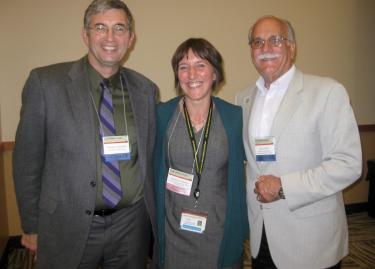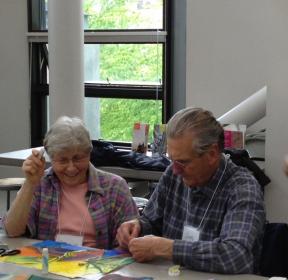The UW Memory and Brain Wellness team is involved in a collaborative effort to improve memory loss care services and community opportunities in WA State. Marigrace Becker, the UW MBWC's program manager of community education and impact, gives an inside look.
As published in Dimensions, the Newsletter of the UW Alzheimer's Disease Research Center - Winter 2017 (Download the PDF or Read online)
*Update March 26th, 2018: We worked with the Long-Term Supports and Services subcommittee to produce a series of guides and statewide webinars about program models that enable people with dementia and their loved ones to stay active and connected in their communities. For our first webinar on starting an Alzheimer’s Café, we received registrations from over 30 counties. Download the Alzheimer's Cafe Model: A Guide to Getting Started in Your Community (PDF)
With a multidisciplinary team of doctors, ADRC researchers, and community education staff, the UW Memory and Brain Wellness Center (MBWC) understands the power of collaboration when it comes to promoting the well-being of people living with memory loss and their loved ones. So when the opportunity arose to play a key role in Washington State’s “Dementia Action Collaborative,” we jumped at the chance.
So what is the Dementia Action Collaborative (DAC), and how are we involved?
It all started in early 2016 when the state legislature approved the WA State Plan to Address Alzheimer’s Disease and Other Dementias. The state plan sets out visionary goals and recommendations on raising awareness, ensuring early and accurate diagnosis and treatment, and improving supports and services for families.
With over 100,000 Washingtonians living with dementia, and the numbers anticipated to triple by 2050, the plan can’t be more timely. Ready to take action on these recommendations, the state convened the DAC in April 2016.

From left: The director of the UW MBWC, Dr. Thomas Grabowski; Dementia Action Collaborative (DAC) team members Marigrace Becker of the UW MBWC and Bob LeRoy of the Alzheimer's Association-WA State Chapter.
The DAC is a voluntary public-private partnership that aims to guide and support the implementation of the state plan. Members are divided into three subcommittees: Public Awareness and Community Readiness, Health and Medical, and Long-Term Supports and Services. The MBWC’s expertise in the realms of clinical care, research and community are perfectly suited to support this vital work.
“Our center has a well-integrated vision for promoting the well-being of people with memory loss, and we’re the state’s primary provider of specialty diagnostic and treatment services,” says Dr. Kristoffer Rhoads, MBWC neuropsychologist. “We want to see this kind of approach filter throughout the state. So we’re glad to be involved – both for the expertise we bring, and what we can learn from others.”
Rhoads chairs the Health and Medical Subcommittee. He and his team members are taking action on three recommendations: convening an expert panel to identify evidence-based standards for diagnosis, treatment, and supportive care for people with dementia, recommending the best cognitive- screening tools, and helping promote effective memory assessment within the Medicare Annual Wellness Visit.
Early on, Rhoads’ subcommittee addressed their first goal by strategically aligning with the governor-appointed Bree Collaborative – a group focused on improving healthcare services throughout the state. Each year, this group chooses up to three health care services with high variability in treatment approach and patient outcomes, and identifies and recommends best practices. For 2017 – thanks to the advocacy of Rhoads and his team – the Bree Collaborative chose dementia.
Rhoads is excited about the progress his team has made and the impact this will have on the community. “These guidelines and tools are something primary care providers have been asking for,” says Rhoads. “Creating a standard pathway to early diagnosis is an important first step –which then enables people to get the treatment and community resources they need in a timely fashion.”
The ADRC’s Dr. Suman Jayadev, UW Medicine neurogeneticist, also lends her expertise to the Health and Medical Subcommittee. She agrees with Rhoads on the value of reliable screening tools – not only as a gateway to treatment interventions that may slow changes in memory and thinking, but also a way for people to find out if they qualify for research studies. “If people can get their Alzheimer’s disease identified early and accurately, they can be alerted to any good clinical trials that might be out there,” she says.
Community Transformation
Along with medical care and research, the MBWC’s experience with building dementia-friendly communities is also being put to use in the DAC. As the MBWC’s program manager for community education and impact, I’ve had the chance to lead a DAC project team producing a fact sheet (see below) that identifies the key elements of a dementia-friendly community.
Too often, people with memory loss and their families end up isolated because of social stigma or other barriers to inclusion. We want to make sure Washington State is a place for all people to belong – by building understanding, challenging stigma, and incorporating simple practices that people with memory loss note would help them fully participate and contribute. For example, we envision providing dementia-awareness training for bus drivers, grocery store clerks, bank tellers, and emergency responders.
In Washington, we have a head start through Momentia – a grassroots movement empowering people living with memory loss and their loved ones to stay connected and active in the community. By defining dementia-friendly communities, and by highlighting this local effort – such as the Frye Art Museum’s here:now program, the memory loss walk at Woodland Park Zoo, or the dementia-friendly volunteer program at Cherry Street Food Bank – our DAC project team hopes to inspire and equip other communities around the state to become dementia-friendly.
By the end of 2016, the DAC had completed a number of the state plan recommendations. One that has many DAC members excited is a “road map” document to help caregivers every step of the way. As Rhoads says, “the road map is going to be, and already is, a huge tangible informative tool for families.”
Collaboration is the key to these early successes. Jayadev notes, “I really enjoy that the DAC has so many facets of the community represented – people who have early Alzheimer’s disease, people who are caregivers, researchers and clinicians, individuals from the state, plus other agencies like housing and senior services. And everyone is genuinely committed to working on this together!”
As the medical director of the MBWC and director of the ADRC, Dr. Thomas Grabowski, Professor of Neurology, UW Medicine, has supported our involvement every step of the way. “The work of the Dementia Action Collaborative aligns perfectly with the MBWC clinic - we strive to embody the best practice in medical care, while building public understanding of Alzheimer’s disease and other dementias so our patients will be able to rely upon a community of support. We’re proud to be involved in this collaborative effort.” —Marigrace Becker, UW MBWC Program Manager for Community Education and Impact







